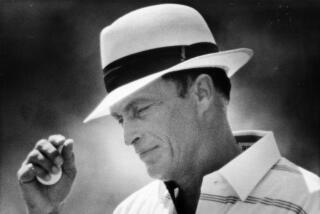Fehr: List to remain secret
Even after the revelation that Alex Rodriguez headed a list of 104 players who failed a steroids test six years ago, the executive director of the players’ union called it “unlikely” that his association would follow the recommendation of several players to release the entire list.
Now that the confidentiality of the list has been breached, Torii Hunter of the Angels and Lance Berkman of the Houston Astros are among the players calling for all of those who tested positive to be identified.
Union chief Donald Fehr said Tuesday he expected to discuss the issue with players in coming weeks but said the anonymity promised to participants in the 2003 drug tests should be honored.
“Whatever rights individual players had under those agreements have to be respected,” Fehr said.
On the eve of spring training, the stain of baseball’s steroid era continued to spread.
One day after Rodriguez -- baseball’s highest-paid player and perhaps its best player -- confessed to using performance-enhancing drugs for three years, Miguel Tejada was charged with lying to Congress when he said he had not heard players talk about steroids and did not know of any teammates using them.
Tejada is expected to plead guilty this morning in Washington. Although he could face up to one year in jail, federal sentencing guidelines call for probation or up to six months in jail, the Washington Post reported.
The Astros have scheduled a news conference for Tejada this afternoon at Houston’s Minute Maid Park.
Spring training camps open this weekend, with Fehr scheduled to visit players in each camp starting Feb. 23. The topics are expected to include how Rodriguez’s name might have been disclosed from a supposedly confidential list of players testing positive in 2003 and whether disclosing the entire list might now be prudent.
“I’m upset that those names on the list came out,” Hunter told The Times. “Someone dropped the ball. Those other 103 players, they might as well bring those names out too. If A-Rod’s name is out there, others should be.”
Berkman called the release of a confidential test result “deplorable.”
“But, on the other hand, the competitive side of me, I’d like to know who took performance-enhancing drugs,” he told the Houston Chronicle. “Those of us that have never taken anything like steroids or HGH or anything like that, I’d like to know who has.”
An American League player, speaking on condition of anonymity because of a union directive not to discuss internal business publicly, said players pressed Fehr last season on how the union would respond in the event a purportedly anonymous test result was disclosed.
“There was lots of talk in spring training last year that the names would come out,” the player said, “and we confronted Fehr in our meeting about it, that this was supposed to remain anonymous.
“A lot of people like me want it to come out now that it’s started. Lots of speculation about who’s on there will be erased.
“There’s a side of me that says it should never come out, but there’s another side of integrity. The majority of us did not cheat. I take pride in not cheating. It’s a tragedy that we’re all being lumped in [with the 104 names].”
Fehr said he did not recall a “confrontation” in any meeting last spring but said he had discussed the issue with players since federal agents seized the test results in 2004. He said he expected to discuss the issue again this spring, given the Rodriguez report, and said he would listen to any players who wanted to make the case for releasing all 104 names.
“I would talk to them and find out what the interest is,” Fehr said. “Beyond that, it’s hypothetical. But I think it’s unlikely.”
Fehr said the union had consulted with lawyers about the possibility of an investigation into who might have disclosed Rodriguez’s result, but he said no decisions had been reached. He said he was disturbed by the disclosure.
“There were confidentiality orders in place,” he said. “We hoped and expected those orders would be complied with.”
The Tejada case follows those of Barry Bonds and Roger Clemens, in which the federal government has pursued players not for using performance-enhancing substances but for allegedly lying under oath by denying use.
Whether Tejada used steroids is not at issue in the charges filed Tuesday. In an interview with Congressional investigators in 2005, Tejada said he never had heard players discuss steroids and was not aware of any of his Oakland Athletics teammates using steroids.
In 2003, according to the Mitchell Report, Oakland teammate Adam Piatt said Tejada asked him about steroids and subsequently wrote two checks to Piatt for the purchase of steroids and HGH. Those checks -- for $3,200 and $3,100 -- were reproduced in the Mitchell Report.
That report was released in 2007. The inconsistencies with Tejada’s 2005 interview prompted Congress to refer him to the Department of Justice for investigation.
--
Times staff writers Mike DiGiovanna and Lance Pugmire contributed to this report.
--
More to Read
Go beyond the scoreboard
Get the latest on L.A.'s teams in the daily Sports Report newsletter.
You may occasionally receive promotional content from the Los Angeles Times.











